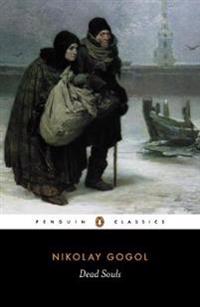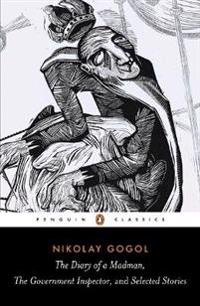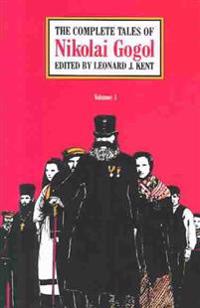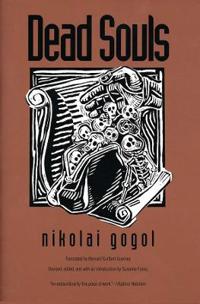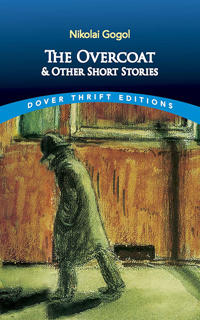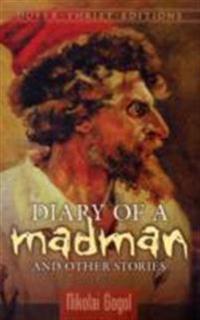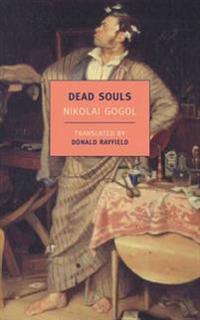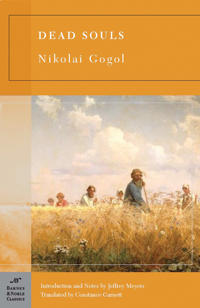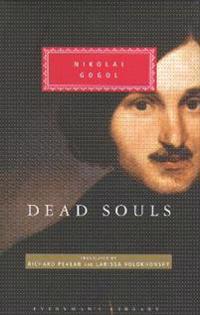Dead Souls (Storpocket)
avNikolai Vasilievich Gogol
ISBN: 9780140448078 - UTGIVEN: 200407In a new translation of the comic classic of Russian literature, Chichikov, an enigmatic stranger and schemer, buys deceased serfs' names from their landlords' poll tax lists hoping to mortgage them for profit and to reinvent himself as a gentleman. Reprint.[...]
Diary of a Madman, The Government Inspector, and Selected Stories (Storpocket)
avNikolai Vasilievich Gogol
ISBN: 9780140449075 - UTGIVEN: 200512Nikolai Gogol's short fiction, collected here as "The Diary of a Madman, The Government Inspector and Selected Stories", deeply influenced later Russian literature with powerful depictions of a society dominated by petty bureaucracy and base corruption. This "Penguin Classics" edition is translated [...]
The Complete Tales (Häftad)
avNikolai Vasilievich Gogol
ISBN: 9780226300689 - UTGIVEN: 198504"This new two-volume edition should do something for increasing Gogol's fame as the most original, imaginative, and exuberant of all Russian writers, as the greatest comedian and humorist among a rather solemn lot."--Rene Wellek, Yale University[...]
Dead Souls (Häftad)
avNikolai Vasilievich Gogol
ISBN: 9780300060997 - UTGIVEN: 199604Gogol's 1842 novel Dead Souls, a comic masterpiece about a mysterious con man and his grotesque victims, is one of the major works of Russian literature. It was translated into English in 1942 by Bernard Guilbert Guerney; the translation was hailed by Vladimir Nabokov as "an extraordinarily fine pie[...]
The Government Inspector (Pocket)
avNikolai Vasilievich Gogol
ISBN: 9780413773210 - UTGIVEN: 2003-08-07The story of a penniless nobody from Moscow who is mistaken for a government inspector by the corrupt and self-seeking officials of a small town in Tsarist Russia, "The Government Inspector", Gogol's masterpiece was regarded by Vladimir Nabokov as the greatest play in the Russian language.[...]
The Overcoat and Other Short Stories (Häftad)
avNikolai Vasilievich Gogol
ISBN: 9780486270579 - UTGIVEN: 199207Four outstanding works by great 19th-century Russian author: "The Nose," "Old-Fashioned Farmers," "The Tale of How Ivan Ivanovich Quarrelled with Ivan Nikiforovich" and "The Overcoat."
[...]Dead Souls (Häftad)
avNikolai Vasilievich Gogol
ISBN: 9781590173763 - UTGIVEN: 2012-09The first of the great Russian novels and one of the indisputable masterpieces of world literature, Dead Souls is the tale of Chichikov, an affably cunning con man who causes consternation in a small Russian town when he shows up out of nowhere proposing to buy title to serfs who, though dead as doo[...]
Dead Souls (Häftad)
avNikolai Vasilievich Gogol
ISBN: 9781593080921 - UTGIVEN: 200901"Dead Souls," by Nikolai Gogol, is part of the "Barnes & Noble Classics"" "" "series, which offers quality editions at affordable prices to the student and the general reader, including new scholarship, thoughtful design, and pages of carefully crafted extras. Here are some of the remarkable feature[...]
Dead Souls (Inbunden)
avNikolai Vasilievich Gogol
ISBN: 9781857152807 - UTGIVEN: 200409Since its publication in 1842, Dead Souls has been celebrated as a supremely realistic portrait of provincial Russian life and as a splendidly exaggerated tale; as a paean to the Russian spirit and as a remorseless satire of imperial Russian venality, vulgarity, and pomp. As Gogol's wily antihero, C[...]

